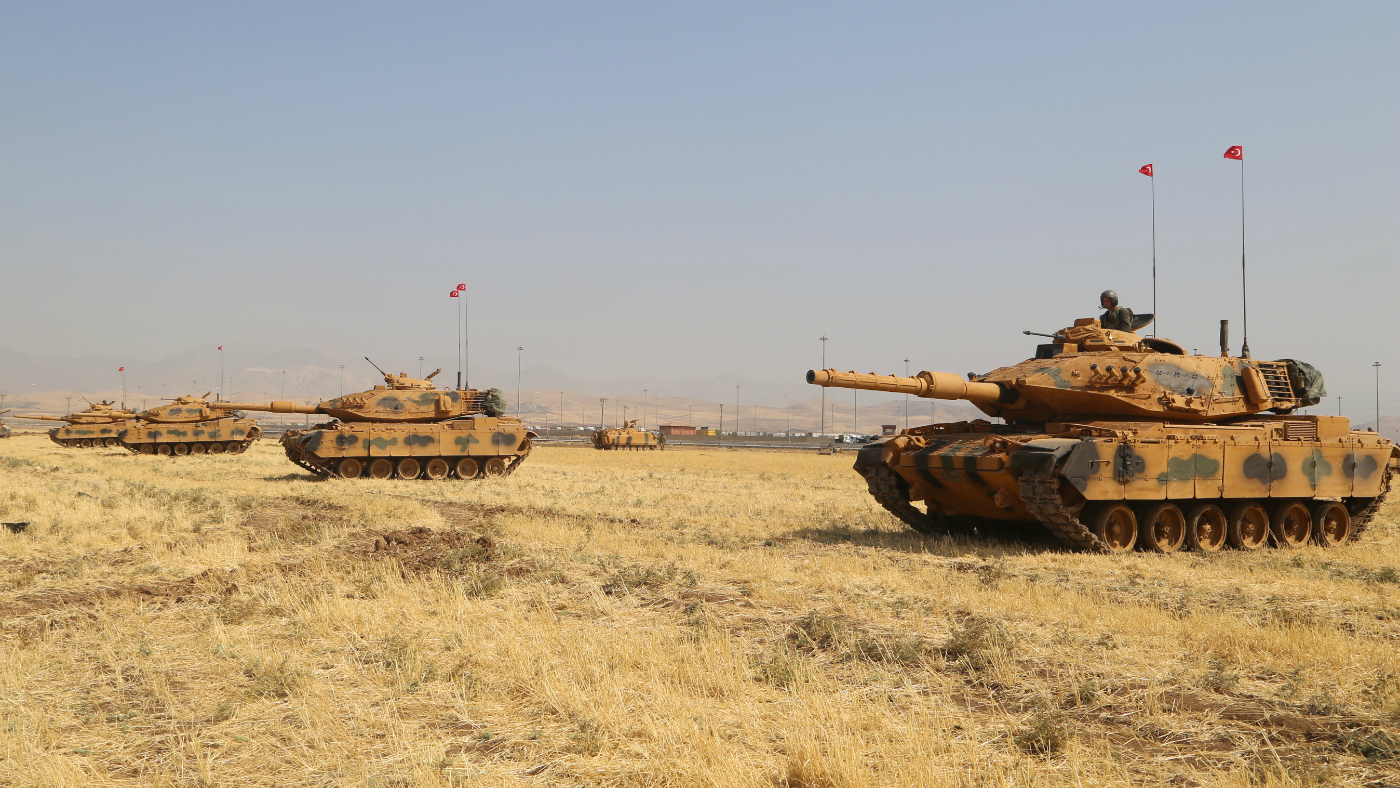Turkey in show of force on Iraqi border
Troops and tanks roll in ahead of controversial referendum on Kurdish independence

A free daily email with the biggest news stories of the day – and the best features from TheWeek.com
You are now subscribed
Your newsletter sign-up was successful
Turkey is flexing its military muscle on the northern Iraqi border in a show of force against next week’s planned vote on Kurdish independence.
Tanks and troops have amassed on the frontier, training rocket launchers towards Iraqi Kurdistan. No prior warning was given and it’s unclear how long the military operation will last.
The drill “reflects the scale of concern in Turkey, which has the largest Kurdish population in the region, that the plebiscite could embolden the outlawed Kurdish PKK which has waged a three-decade insurgency in Turkey’s southeast,” says Reuters.
The Week
Escape your echo chamber. Get the facts behind the news, plus analysis from multiple perspectives.

Sign up for The Week's Free Newsletters
From our morning news briefing to a weekly Good News Newsletter, get the best of The Week delivered directly to your inbox.
From our morning news briefing to a weekly Good News Newsletter, get the best of The Week delivered directly to your inbox.
Turkish defence minister Nurettin Canikli warned that next Monday’s referendum could lead to regional conflict and vowed Turkey would take “every step” needed to stop a similar movement north of the border.
His comments were echoed by President Recep Tayyip Erdogan during a speech at the UN General Assembly yesterday.
“New crises in the region, such as bids for independence, could spark new conflicts and must therefore be avoided at all costs,” he said. “We urge Iraq’s Kurdish Regional Government to abort the steps they have taken in that direction.”
Iraqi Kurdistan has effectively been a semi-autonomous state, with its own president, prime minister and parliament, since the fall of Saddam Hussein more than a decade ago, but many Kurds believe secession from Iraq is the only way to ensure that their rights will be fully protected.
A free daily email with the biggest news stories of the day – and the best features from TheWeek.com
The central government in Baghdad is fiercely opposed to the vote, as is the region’s non-Kurdish population.
Western powers, meanwhile, have voiced concern that the referendum and any ensuing violence will distract Iraqi and Kurdish forces from the ongoing battle against Islamic State in Iraq and Syria.
But Kurdish authorities remain defiant and show “no sign” of bowing to international demands and halting the vote, says The Guardian.
-
 The Olympic timekeepers keeping the Games on track
The Olympic timekeepers keeping the Games on trackUnder the Radar Swiss watchmaking giant Omega has been at the finish line of every Olympic Games for nearly 100 years
-
 Will increasing tensions with Iran boil over into war?
Will increasing tensions with Iran boil over into war?Today’s Big Question President Donald Trump has recently been threatening the country
-
 Corruption: The spy sheikh and the president
Corruption: The spy sheikh and the presidentFeature Trump is at the center of another scandal
-
 Epstein files topple law CEO, roil UK government
Epstein files topple law CEO, roil UK governmentSpeed Read Peter Mandelson, Britain’s former ambassador to the US, is caught up in the scandal
-
 Iran and US prepare to meet after skirmishes
Iran and US prepare to meet after skirmishesSpeed Read The incident comes amid heightened tensions in the Middle East
-
 Syria’s Kurds: abandoned by their US ally
Syria’s Kurds: abandoned by their US allyTalking Point Ahmed al-Sharaa’s lightning offensive against Syrian Kurdistan belies his promise to respect the country’s ethnic minorities
-
 Israel retrieves final hostage’s body from Gaza
Israel retrieves final hostage’s body from GazaSpeed Read The 24-year-old police officer was killed during the initial Hamas attack
-
 China’s Xi targets top general in growing purge
China’s Xi targets top general in growing purgeSpeed Read Zhang Youxia is being investigated over ‘grave violations’ of the law
-
 Panama and Canada are negotiating over a crucial copper mine
Panama and Canada are negotiating over a crucial copper mineIn the Spotlight Panama is set to make a final decision on the mine this summer
-
 Why Greenland’s natural resources are nearly impossible to mine
Why Greenland’s natural resources are nearly impossible to mineThe Explainer The country’s natural landscape makes the task extremely difficult
-
 Iran cuts internet as protests escalate
Iran cuts internet as protests escalateSpeed Reada Government buildings across the country have been set on fire